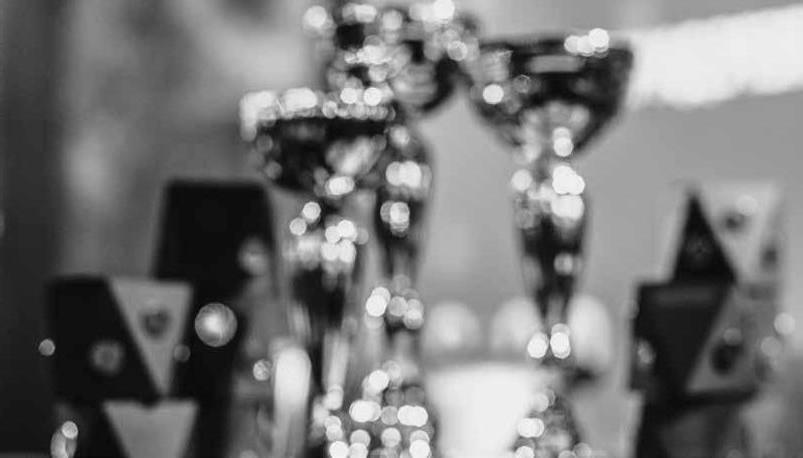
12 minute read
Class Champions
BECOME A CLASS CHAMPION
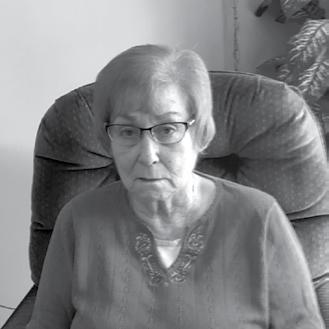
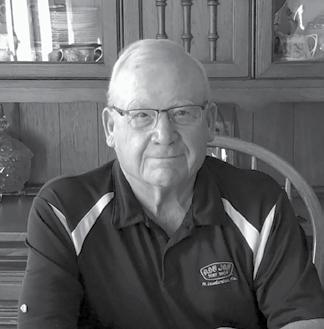

Rose Hees, Class of 1960-61 Jack Price, Class of 1966 Judy May-McDonald, Class of 1985
Stay connected to your fellow Lakeland College alumni as a Class Champion.
The Class Champions Program enriches class reunions and deepens connections with alumni by supporting volunteers to act as class representatives. They'll reach out to former classmates to encourage them to attend their milestone reunions of five to 70 years!
Become a Class Champion today!
Make phone calls
Rekindle friendships
Relive the good old days
Take a leading role in reconnecting your college classmates with Lakeland

Lakeland alumna Amanda Noyce wasn’t sure what to expect when she enrolled in heavy oil power engineering (HOPE). She had no experience in the industry, wasn’t sure what exactly a power engineer did and didn’t know if she’d enjoy the program at all. She ended up falling in love with it and, with the support of her instructors, landed her dream job at the Cenovus Energy Upgrader in Lloydminster. “I did more research into what a power engineer does and it really interested me to get out of my comfort zone,” Noyce says. “I figured that at least I’d learn about motors and a little bit of plumbing and electrical. Good life skills. But I ended up really enjoying it.” Coming to Lakeland with an open mind, Noyce couldn’t help but feel a little anxious on her first day. She credits her instructors for helping her overcome those nerves and excel in her studies.
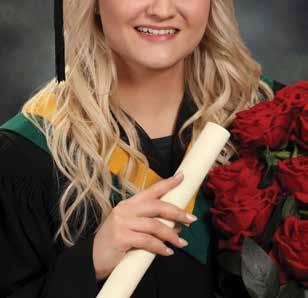
“I was terrified my first day,” she confesses. “Coming into a program like this, where I had no previous knowledge and as a woman, I didn’t know if I could do it. But my instructors really helped me to thrive. They were honestly the best part of my Lakeland experience. I could call them if I had questions about an assignment I was working on, even if it was late. They’d drop anything to help me. They’d stay late, come in early, reach out on weekends. They went out of their way to make me feel like I was important.” My time at Lakeland was so worth the time and investment and I enjoyed it so much. At the end of the day, I ended up getting my dream job.
Noyce graduated in 2020, though her final semester was interrupted by the COVID-19 pandemic. Despite the abrupt change, Noyce says her positive Lakeland experience wasn’t impacted because her instructors managed to make the online transition work seamlessly. After graduating, Noyce was hired as a full-time plant technician at the Cenovus Energy Upgrader, where she had completed both of her practicums. She felt confident during her practicums and now in her full-time position, credits Lakeland’s facilities, hands-on training and quality education for preparing her to succeed in the industry. “The labs at Lakeland are awesome,” she says. “The Cenovus Energy Lab is such an amazing place to learn. I loved that aspects of heavy oil were mixed with the power engineering parts of this program. It meant that when I got on the job, I could recognize the equipment and recognize the different processes. I already knew the chemical reactions that were essential for the job. My time at Lakeland prepared me so well for this position. “It’s the exact job I want, it’s exactly what HOPE prepared me for. My time at Lakeland was so worth the time and investment and I enjoyed it so much. At the end of the day, I ended up getting my dream job.”
INFLUENCINGTHE FUTURE OF SUSTAINABLE AGRICULTURE
Lakeland College alumna Jess Verstappen credits her passion for youth in agriculture, and sustainable farming with landing her on the list of Canada’s most influential people in agriculture.
Canadian Western Agribition released the Top 50 most influential people in Canadian Agriculture for the first time on Canada’s Ag Day in 2021. Nominations for the list were accepted from all across Canada with the final 50 selected by a panel of judges, who narrowed the list down to a top 10 in five categories: mentors, upstarts, innovators, deal makers and designated hitters. Verstappen landed in the upstart category. “I’m extremely honoured,” Verstappen says. “It definitely caught me by surprise. I feel like I’m so early in my career and path in agriculture and there’s so much left for me to do. It’s amazing to be recognized so early in my career and that people can see that what I’m trying to do is making a bit of a difference.”
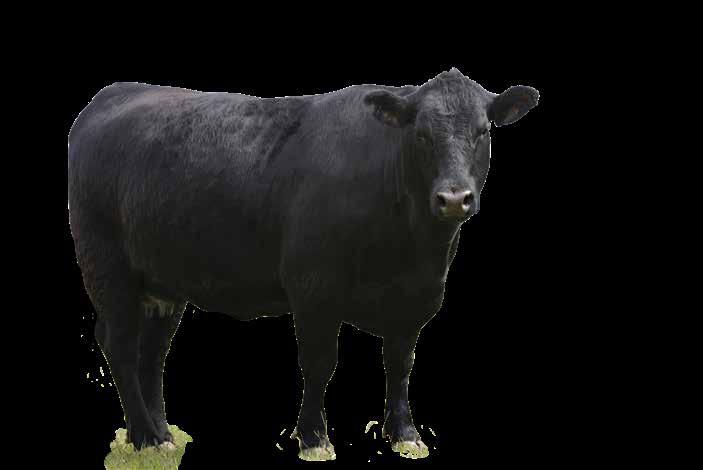
Originally from Holland in The Netherlands, Verstappen moved to High Prairie, Alta. when she was still a child. Raised on a cattle and sheep operation, Verstappen had her heart set on attending Lakeland College since Grade 9, when she first learned she’d be able to take her horse with her.
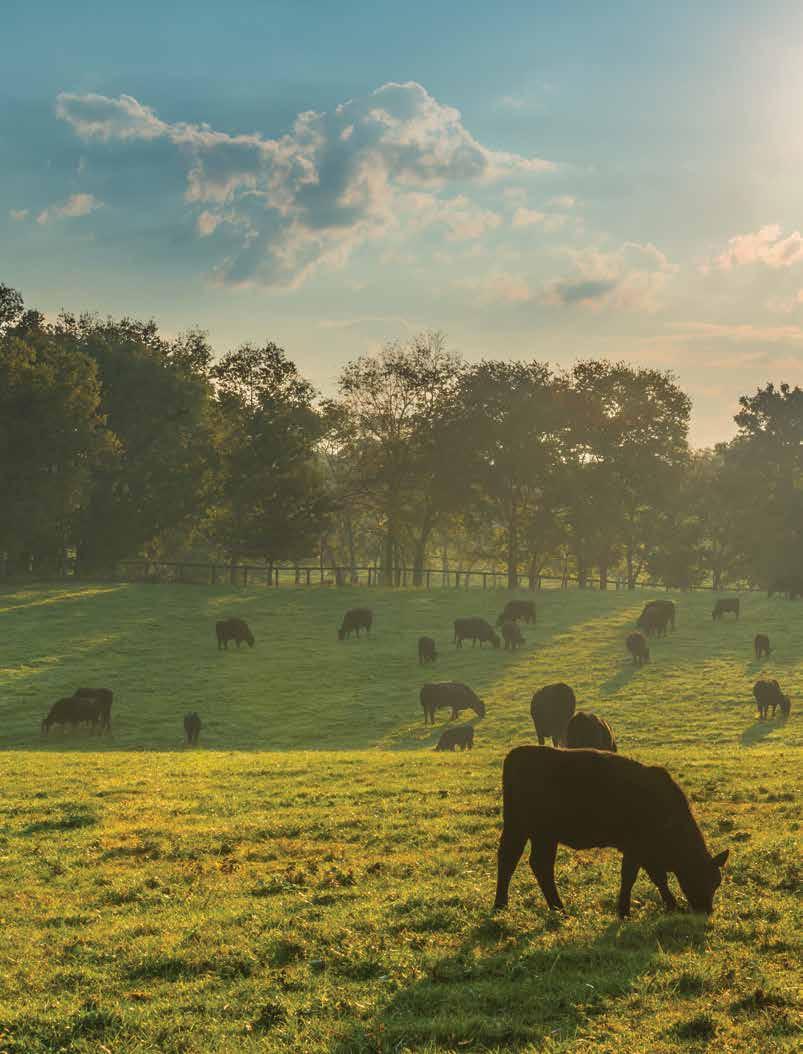
“I wanted to make sure that when I went to college, it was an academic focus but was also going to build my skills in networking abilities with people in similar industries,” Verstappen explained. “I have a passion for judging so Lakeland’s judging team was especially exciting. Being able to learn from some of the best in the business at Lakeland was a huge draw.” She intended to apply to the animal science technology program but in the end, her mother convinced her to try something new – an unconventional move that Verstappen credits with her unique approach to agriculture now. “The day I was applying, my mom asked me why I was going into animal science and I told her how much I love animals and cows. She told me that there was so much more I needed to learn in order to manage a farm properly,” Verstappen explains. “She suggested I try looking into something else that would add to our cattle operation instead of growing the knowledge I already had. Bring home some new ideas.”
Verstappen ended up enrolling in Lakeland’s environmental sciences diploma and majored in conservation and restoration ecology. “Looking back now, I wouldn’t change it for the world. Those were some of the most valuable courses I’ve ever taken,” Verstappen says. “It really gave me a good start with knowledge on plant biology, how things grow and what we need to do to rejuvenate pasture and crop land. Regenerative and sustainable agriculture really became a big part of what we like to do on our farm.”
Following her environmental sciences diploma in 2016, Verstappen completed Lakeland’s agribusiness diploma in 2017 and then a year of university transfer courses to complement the management skills she learned in agribusiness. She explains, “The agribusiness side really helped me understand the risk-reward ratios and how farm management works. I was raised on a farm but I wouldn’t say that I had a background in management. I knew daily what needed to be done, but I didn’t have any idea how to run a farm from a business standpoint.” The combination of environmental sciences, agribusiness and not a single course that I didn’t keep my notes from. I met some amazing people and great instructors. The true value I got from going to Lakeland was being able to gain an incredible education while being able to network with so many people.” Verstappen operates the first predator and wildlife-friendly ranch in Canada with her family and works at Cargill. “We try to be a leader on the forefront of existing with the wildlife and nature that surrounds us,” she says. “Coming from Holland, it’s a passion for us. There isn’t really a whole lot of nature left in Holland, so coming to Canada, we wanted to maintain some forested areas on our land instead of clear cutting. We wanted to be able

management studies has given Verstappen a unique perspective on agriculture, one which helped land her on Agribition’s Top 50 list. “My education has made me so well-rounded for the ag industry,” Verstappen says. “The variety of options played together so well. I loved my time at Lakeland. The hands-on learning was such a crucial part of my overall growth. There’s to see wildlife around us because it was something we didn’t have before. It’s really important for us to try to maintain that ecosystem around us. "The key to being a predator and wildlife-friendly ranch is running a sustainable and responsibly managed operation," Verstappen adds. She and her family have found that avoiding wildlife conflict and co-existing naturally with the predators around them has not only allowed them to protect the ecosystem, it has also proven to be more profitable, with less predator loss. “There is a profitability in sustainable farming,” Verstappen explains. “We have our livestock guardian dogs and really good fencing and have had great success with that strategy from a long-term livestock management approach in reducing and eliminating wildlife losses on our operation." Verstappen believes that sustainable and responsible farming is a growing trend in the agricultural industry, especially with steadily increasing public scrutiny on agriculture. “From a long-term standpoint, I saw what happened with agriculture in Holland and the lack of nature there. I don’t ever want Canada to get to that point. There are a lot of other people realizing that too.” Verstappen also tries to be a good mentor for other youth looking to get into the industry, particularly those who may not have been raised in it. “I try to show the long-term success of sustainable agriculture and be a strong influence for other youth in agriculture. It’s not easy to integrate into a whole different industry, so I try to be a resource and mentor people, and help them out in any way I can to see the future in agriculture.” Brett McRae, who graduated from Lakeland’s agribusiness program in 2007, also made the Top 50 list.
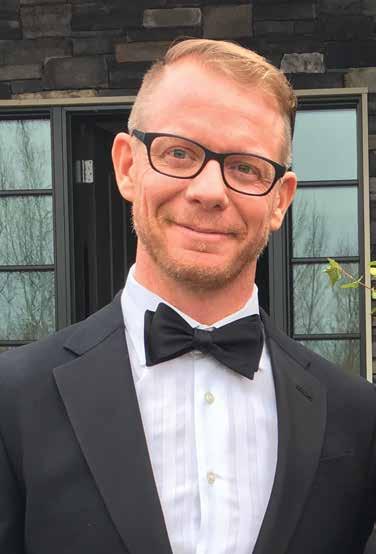
THE FACETS OF CHOICE AND FATE: ALUMNUS SHARES HOW HE
GOT HIS START IN LAW
It’s astonishing how a moment of error can alter a path believed to be so clearly laid out.
where he could complete a practicum Some faces may placement with the RCMP. change, but Lakeland’s According to Wakefield, he stumbled This is, at least, applicable to Lakeland spirit stays the same. into law after a poor decision resulted College alumnus Jeremy Wakefield, Class in missing the opportunity to work with of 1993 university transfer. the RCMP. Instead, he selected a position with the Surrey With aspirations of entering the Royal Canadian Mounted Crown Counsel Office and took a chance on learning a Police (RCMP), Wakefield enrolled in Lakeland’s university different facet of law enforcement. transfer program to take courses in English, psychology, “I did my practicum, and I hit it off famously with the sociology and math, which would help him achieve a lawyers there so I was asked to come back for a second degree in criminology. He transferred his credits to the practicum because of a big case we were working on at the University of the Fraser Valley’s criminal justice program, time. I thought becoming a lawyer wasn’t such a bad idea,
Jeremy Wakefield (middle) was a panelist at the 2020 UT Alumni Social.
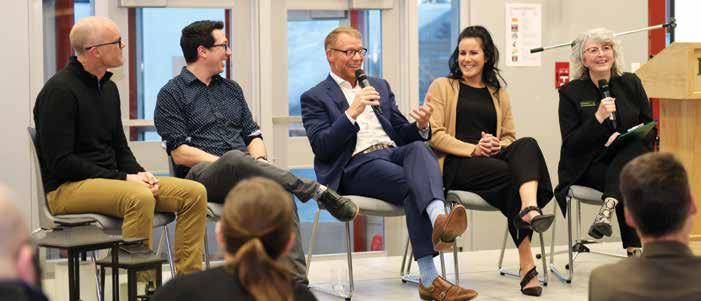
to some universities, and the rest is history. “Some bad decisions worked out well,” he says. Wakefield completed his bachelor’s degree in law from the University of Alberta and then returned to his hometown, Lloydminster, Alta., in 2000 to start his legal practice. Currently, his practice areas include residential and commercial real estate, corporate and commercial transactions and wills and estate matters at Fox-Wakefield, where he is also a partner. He’s also a member of the Law Society of Alberta, Law Society of Saskatchewan and Canadian Bar Association.
“Lloydminster is the land of opportunity. Many of my peers who went to work in major centres have done well, but I don’t feel like I’m missing out. I get to work on the same stuff, but I’m not just a cog in a wheel to keep the machine running; I get to take more of a lead on cases. Building my practice has been an awesome experience.” It’s the people, he adds, that keep him moving forward in this line of work, whether working with a client or collaborating with his peers. He not only credits the local bar association but the city of Lloydminster entirely. “We have a great staff who honestly do all the work and we get all the glory. I’m very grateful that I have strong, competent staff to lead the way here. Even with the pandemic, we’ve continued to grow and thrive. “Lloydminster is home to me. I grew up here, met my wife here and am now raising my family here. I also knew I wanted to support the organizations that have helped me, Lakeland being at the top of the list.” Wakefield has been involved with several organizations, such as Big Brothers and Sisters of Lloydminster, the Lloydminster Region Health Foundation, and Lakeland’s university transfer advisory committee. “Some faces may change, but Lakeland’s spirit stays the same. Lakeland is near and dear to my heart because I know it wouldn’t have been possible without the college’s contribution to my ability to pursue my career goals. I find a recurring theme at Lakeland College between the staff and administration; they’re always looking to see what they can do better. It’s a conducive, supportive atmosphere to learning and excelling. It’s collaborative, and the students’ welfare is foremost at the front of the decision-making. Not that I’m coming up with great ideas, but I feel heard when I’m asked to offer input, and I’m happy to provide it.” Wakefield has also participated in numerous college events, such as the university transfer alumni social in 2020 where he shared his
Lakeland experience with alumni and current students.











